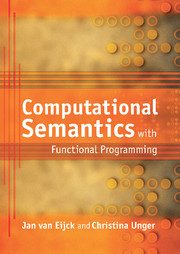Book contents
- Frontmatter
- Contents
- Foreword
- Preface
- 1 Formal Study of Natural Language
- 2 Lambda Calculus, Types, and Functional Programming
- 3 Functional Programming with Haskell
- 4 Formal Syntax for Fragments
- 5 Formal Semantics for Fragments
- 6 Model Checking with Predicate Logic
- 7 The Composition of Meaning in Natural Language
- 8 Extension and Intension
- 9 Parsing
- 10 Handling Relations and Scoping
- 11 Continuation Passing Style Semantics
- 12 Discourse Representation and Context
- 13 Communication as Informative Action
- Afterword
- Bibliography
- Index
1 - Formal Study of Natural Language
Published online by Cambridge University Press: 05 June 2012
- Frontmatter
- Contents
- Foreword
- Preface
- 1 Formal Study of Natural Language
- 2 Lambda Calculus, Types, and Functional Programming
- 3 Functional Programming with Haskell
- 4 Formal Syntax for Fragments
- 5 Formal Semantics for Fragments
- 6 Model Checking with Predicate Logic
- 7 The Composition of Meaning in Natural Language
- 8 Extension and Intension
- 9 Parsing
- 10 Handling Relations and Scoping
- 11 Continuation Passing Style Semantics
- 12 Discourse Representation and Context
- 13 Communication as Informative Action
- Afterword
- Bibliography
- Index
Summary
Summary
This chapter introduces computational semantics as the art and science of computing meanings for the expressions of a language. The chapter starts with a general overview of the formal study of language. The broad areas of syntax, semantics and pragmatics are distinguished, and the concept of meaning is discussed. Since the book will focus on language as a tool for describing states of affairs and for conveying information, and since logicians have designed special purpose tools for just these tasks, logic will be important to us. The chapter emphasizes the similarities between natural languages and the formal languages that have been designed by logicians and computer scientists. The chapter ends with a discussion of the usefulness of (functional) programming for computational semantics, and with an overview of the rest of the book.
The Study of Natural Language
Language is one of the most remarkable capacities of human beings and one of the distinctive features that set us apart from other inhabitants of this planet. Human languages are sophisticated systems for manipulating information-encoding symbols, and for composing sounds into structured expressions such as words, phrases, and sentences. These expressions can then serve in numerous ways for communicative actions like information exchange, persuading and deceiving, expressing thoughts, reasoning, and much more.
Linguistics is the scientific study of human language. To make linguistics into a science it is necessary to specify the object of study.
- Type
- Chapter
- Information
- Computational Semantics with Functional Programming , pp. 1 - 14Publisher: Cambridge University PressPrint publication year: 2010



